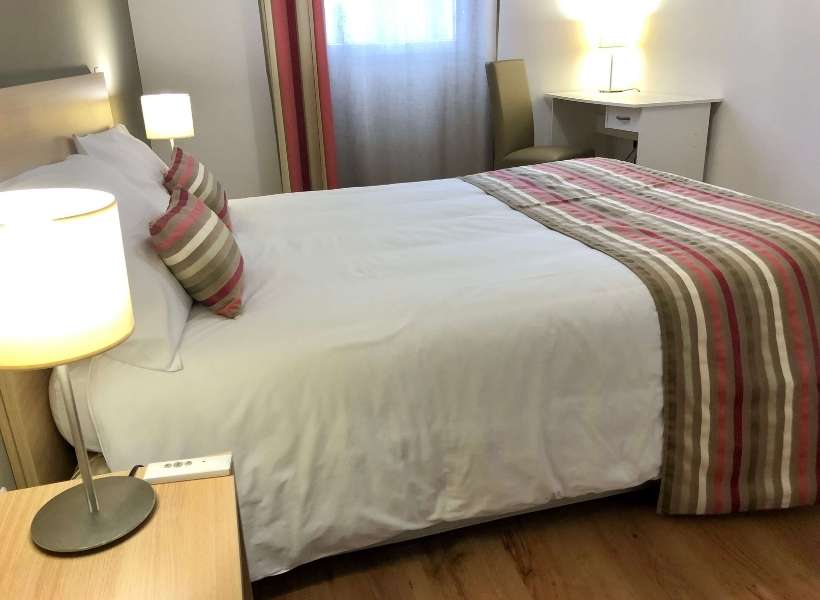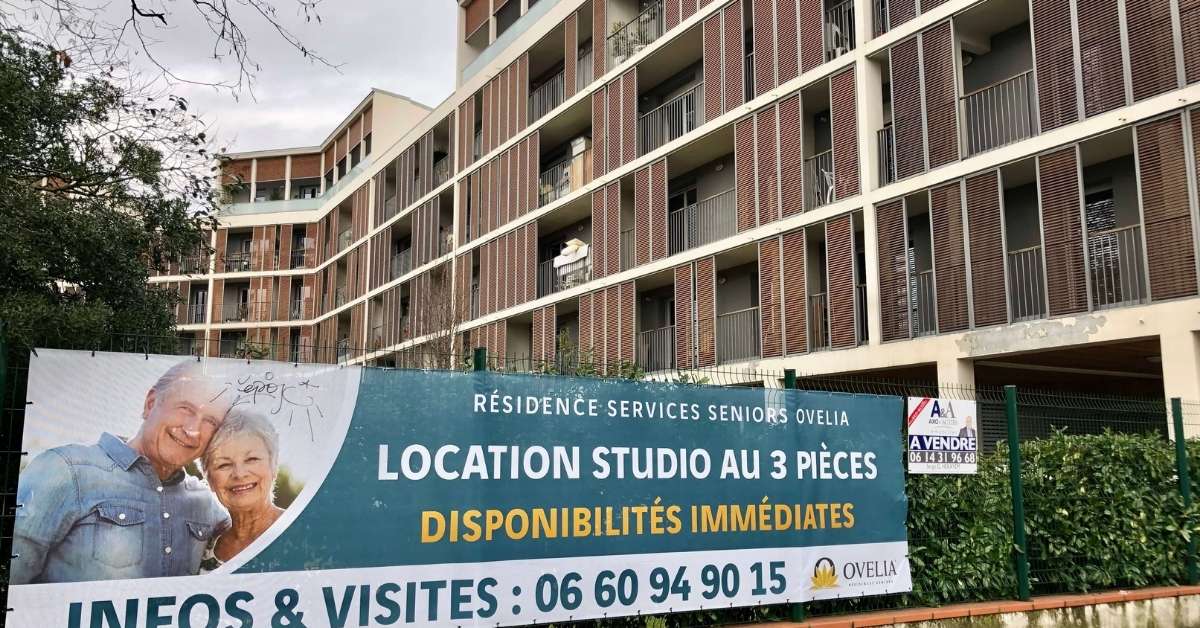Categories: France How To, French Customs & Lifestyle, Moving to France
Today Annie Sargent brings you a conversation with Carolyn Gates and Julia Maurice about growing old in France. Even if you have no intention of ever moving to France, as a Francophile you might be interested in what happens as people grow old in France.
Having said that, a lot of my listeners would love to move to France someday. It may or may not happen, but they are keenly interested in the question. If you move to France and all goes well, you’ll be growing old in France. What options will you have then? We’ll explore the 3 things that can happen as a person grows old in France.
Growing Old in Your Own Home
This is the most desirable option and you'll be surprised how many things in France make that possible. And it's not just me French born and raised that says so. My guest Carolyne from Maryland has one elderly relative in France and the other in America. She compares the two situations and it appears it's better in France! So, let's dig into it: What makes it possible stay at home when growing old in France?
Age-Proof Your Home
If you’re moving to France and will be renovating a home in France, make sure it will meet your needs as you age. The issues are the same in France as everywhere else:
Watch Those Steps!
Even if you don’t lose the ability to go up and down stairs, you could break a toe or have painful hip that will make it hard to go up and down stairs.
Increase Door Width
If you’re renovating your doors, ask yourself what if I need to be in a wheelchair? Again, hopefully the wheelchair will just be temporary, but people break legs. Talk to the folks doing the work for you and ask them to make your home as accessible as possible.
Choose Your Terroir Carefully
Don’t buy your new home in the total boonies where there are no services and little to do. You may have noticed with Covid that the less we do the less motivated we are to do things? I think the same happens to people who move to really remote places. They get used to the bare minimum and that’s not good for anyone as they age.
Get a Carte Vitale and Get to Know the French System
If you move to France, one of your highest priorities should be to get into the French medical insurance system. Then you’ll get a “carte vitale” which is our health insurance card.
It bears repeating that in France it’s the health insurance that’s a national program. Most doctors, nurses, pharmacists are in business for themselves, but they all take the national health care card and agree to charge set fees. That’s how health care is so cheap in France BOTH for people in the system and for people who are not.
French doctors are paid well, but nothing like American doctors. French doctors also have no medical school debt and don’t pay high insurance rates. But still, it’s the fact that the government negotiates rates that forces doctors to stay reasonable. They can ask for more, but only a few doctors get away with that.
The Carte Vitale Is Your Ticket into the French Health Insurance System
How do you get that card? I got my Carte Vitale when I moved home to France and registered my business. My husband got his through his job. Our daughter gets hers through her university. But that’s not the only way. Folks who retire in France from all over the world get this card all the time. There is a process. I’m sure it’s convoluted and will give you a headache, but it can be done and it should be a priority.
Official site where you actually apply for your Carte Vitale: Ameli. You need to enter a valid French zip code before you can do anything else)
Article about getting your carte vitale in France and another one that might be helpful.
Medical Services Are Cheap in France Compared to America
But even if you don’t get the health insurance card you can pay out of pocket and in France that’s a LOT cheaper than in America. A visit to the doctor’s office is 25€ in France. Specialists charge 55€ for a visit. For a while I needed a monthly shot. A nurse came to my home to do it and I think I paid 7€ for that. A cleaning at the dentist is 28.92€. It’s cheap! Crowns are not covered well in France, expect to pay around 1,000€ out of pocket. Don’t know about implants because I don’t have any, but it’s probably in that ball park. Fancy glasses will run you 500-800€.
How the French System Helps People Live in their Own Homes
The extraordinary thing about health care in France is that it’s a care system. Here are some things about growing old in France the system does particularly well.
Medical Taxis
I know a couple of people who are on chemo right now. They have to get to the hospital to get their chemo. We have a whole system of medical taxis in France. A medical taxi will show up at their home to take them to the hospital and will come back to take them home a few hours later.
And they don’t just drop them off in front of the door either. They take them right to where they need to go. Those are not necessarily ambulances; it could be a regular car and a driver who’s been trained to assist people get in and out of the car if needed and they know hospitals and clinics like the back of their hands. They also have preferred parking, etc.
That alone helps people age in their own homes. They don’t have to worry about who’s going to drive them to medical appointments if they can’t drive. Once you have a general practitioner in France and they know you and your needs they will give you a voucher for a medical taxi as needed.
Home Visits Are Part of the Plan
Same with getting blood drawn. The phlebotomist can come to your home if it’s clear that the patient can’t go to him or her. Doctors can do home visits. It’s restricted to specific circumstances, but it’s possible and with elderly patients it happens all the time.
What's an Infirmière Indépendante?
We have a whole network of great home nurses in France. If you have surgery in France and you need bandages changed, a nurse will come to your home to do it. If you need wound care for any reason, a nurse will come to your home to do it. I mentioned needing a monthly shot. I called my local nurse and arranged it. In my village there are 3 nurses that go around taking care of people at home in our village.
One or more nurses can setup a practice as “infirmière indépendante” (which is French for independent nurse). They have to have an office with office hours and you can go get taken care of there or they come to you. You can find them by searching for cabinet d'infirmière and your zip code online, they are everywhere! It’s good to have a good relationship with these nurses as you get older. Be nice to them and they’ll be nice to you!
Annie's Experience with her Ageing Father
My father needed a lot of nursing care and my mother hardly needed any, so it really depends on the person. It started in his 70s with a leg wound that didn’t heal. They changed his bandage a few times a week. After my mother died and he was living alone I noticed that he was really confused about his medications. I talked to his nurse and she said just get a prescription from his doctor and we’ll assist. It was never a problem after that.
Every time he needed more care from a nurse, we talked to his doctor about it, he wrote a prescription detailing what was needed, and the nurses took care of it. I was proactive and went to see the doctor with him because he would just tell his doctor everything was fine when it wasn’t. We had to have a few difficult conversations, but we managed.
Late in the game it came to the point where he couldn’t lift his arms or bend down so a nurse came to give him a shower twice a week at home. He wasn’t happy about it, but you’ve got to do what you’ve got to do.
If nurses hadn’t been there, he would have had to go to a facility 5 years before it became inevitable for medical reasons. We chose to give his nurse a key to his building and apartment. They were in and out of there a lot. They called us if they had any questions or concerns. All these nurses in private practice in France are a GEM.
There Are Lots of Home Services for the Elderly in France!
You can also get meals delivered for a nominal fee. A cleaning person can come help. My father had normal retirement income for an electrician. But he was cheap. He wouldn’t have paid for all these services out of pocket. He could have but he was cheap, so he didn’t want to. That’s a problem. If you need help, just pay for it, OK? We talked to a social worker who looked into it and told us all the things he could qualify for. Then it was a matter of doing the paperwork. But even if you can’t qualify to get it for free, those services are totally affordable. Save your pennies and use them to hire help when you need it.
Elderly French people can also get assistance to go do their shopping. When you go to the store in France you may notice an elderly person doing their shopping with a much younger helper who says “vous” to them. That’s a person who’s getting paid to go to the store with them, walk with them, keep them active as long as possible. Is it expensive? No, for most of them it’s free.
And again, it’s the family doctor who writes a prescription saying this person needs help getting out of the house to go do whatever. Right now, that’s not happening as much because of Covid, but it’ll start up again because it’s important to keep doing daily tasks when you get old. You need a good family doctor who cares and is willing to help you stay in your home as long as possible.
I went to nursing homes this week in preparation for this episode and it renewed my resolve to stay active and independent as long as I can. I know the best laid plans don’t always work out, but I will do my part to stay home as long as possible. And for the rest I’ll rely on the great services made affordable by the French health insurance system.
Moving into a Residence with Services for Older Adults
When you grow old in France, you could move into a “Résidence Services Senior” what you would call a retirement community in America. Options are limited in France because it's a new industry. To find them, search for the following terms with the zip code that's of interest to you.
- “Résidence Sénior”
- “Sénioriales”
- “Papy Loft”
- “résidence services seniors”
The Résidence Services Seniors I visited in Toulouse (see photo above) was very much like a well-appointed hotel without being all that fancy. It featured a restaurant, a heated pool, and an activities lounge. Seniors can sign up for art classes that include "gym douce" (stretching excercises), aqua gym, yoga, dictation (French people have a fascination with spelling!), sophrology, history, and cooking. There was a good sized garden with tables, chairs, benches, etc.
The restaurant features a menu that look very much like any family restaurant in France. The room looks lovely and it's possible to invite family and friends over for a meal in a private dining room.
The Cost of Senior Residences
Only seniors with a minimum monthly retirement income of 2,500 € per month are admitted in the facility I visited. In France it is common to only take into account monthly income and not savings.
It does not seem wildly expensive to me, especially when compared to hotel and restaurant life. But it is a fact that this calculation excludes a lot of people who had professions that don't yield great retirement income, even if they were able to save up a lot of money. That's something French people have to deal with their whole lives, but it's a concept that might surprise new comers.
Learn more by visiting these website:
https://www.capresidencesseniors.com/annuaire-villages-senior-1783/
https://www.seniortransition.fr/village-senior/
https://blog.residentiels.fr/village-senior-residence-services-seniors/
https://blog.residentiels.fr/village-senior-residence-services-seniors/
https://blog.residentiels.fr/opter-residence-services-seniors/
EHPAD or Établissement d'Ébergement pour Personnes Âgées
For older adults that need help full-time we have long-term care facilities that can be more or less medicalized. We call those EHPAD in France, and my guests Carolyn and Julia will share their experience with those. It stands for Établissement d'Ébergement pour Personnes Âgées.
Carolyne's Experience with an EHPAD
Carolyne is from Maryland and is married to a French person. Her father-in-law is in an EHPAD linked to a CHU which stands for Centre Hospitalier Universitaire. He is there because he has Alzheimer's disease.
This EHPAD has a long waiting list to get in, this is true in all EHPAD in France.
The care is very good at the EHPAD and there is good support for spouses who don't live there.
Carolyne compared the care her father-in-law is getting in France to what her mother is getting in the US. A lot more is covered by insurance in France than in America.
Language is a problem as people get older. It would be really hard to grow old in France if you don't speak the language. You would also need to be acclimated to French food and culture.
Conversation with Julia about Growing Old in France
Julia was a music therapist at an EHPAD that took care of Alzheimer's patients. Julia played violin and got the patients to join in with instruments. She massaged hands and encouraged them patients to talk and sing. Café philo were times to discuss big ideas. Her EHPAD had staff of 22 nationalities, so there was a large diversity of languages in the staff.
Julia likes the small independent EHPAD and not the large companies that run lots of different EHPAD. She doesn't like ORPEA and KORIAN. She likes ISATIS because it's at a better scale.
French Tip of the Week
I’ve got a fun French expression for you today: faut pas pousser ! You’ve got a direct equivalent in English : don’t push it! Faut pas pousser.
But in French we add some flair to it: we usually say “Faut pas pousser mamie dans les orties” and also “Faut pas pousser le bouchon trop loin”. “Faut pas pousser mamie dans les orties” is literally don’t push grandma into the stinging nettles. No, really, don’t do it! Faut pas pousser mamie dans les orties.
Or “Faut pas pousser le bouchon trop loin” and this one has to do with one of our favorite past-times Pétanque ! When playing pétanque someone throws a bouchon aka cochonnet 5 to 10 meters away and everyone needs to get their boules as close as possible to it. I think you call that a jack in English. So “Faut pas pousser le bouchon trop loin” means don’t throw the jack too far.
So, here are your 3 ways to say “Don’t push it in French”
- Faut pas pousser
- Faut pas pousser mamie dans les orties
- Faut pas pousser le bouchon trop loin
More episodes about how things run in France
FOLLOW US ON:
Discussed in this Episode
- Growing old in your own home
- Age-proof your Home
- Watch those steps!
- Increase door width
- Choose your terroir carefully
- Get a Carte Vitale and get to know the French system
- The Carte Vitale is your ticket into the French health insurance system
- Medical services are cheap in France compared to America
- How the French system helps people kive in their own homes
- Medical taxis
- Home visits are part of the plan
- What's an infirmière indépendante?
- Annie's experience with her ageing father
- There are lots of home services for the elderly in France!
- Moving into a residence with services for older adults
- The cost of senior residences
- EHPAD or Établissement d'Ébergement pour Personnes Âgées
- Carolyne's experience with an EHPAD
- Conversation with Julia about growing old in France
- French tip of the week "faut pas pousser"
Subscribe to the Podcast
Apple Google Spotify RSSSupport the Show
Tip Your Guides Extras Patreon Audio ToursIf you enjoyed this episode, you should also listen to related episode(s):

Categories: France How To, French Customs & Lifestyle, Moving to France



